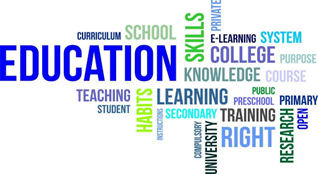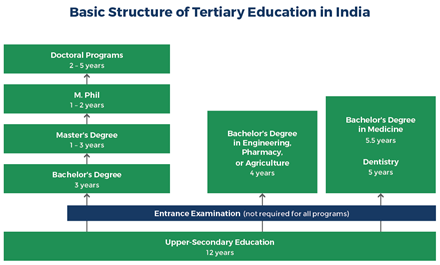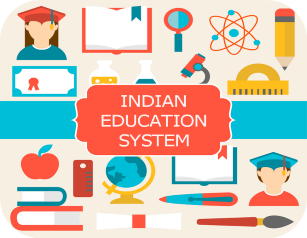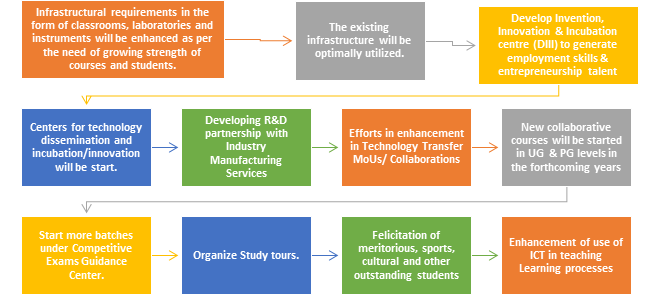Agrasen College, established in 2018 as an affiliating college of the University of Rajasthan has a story to tell...a success story. In the life span of an educational institution, two years may be just a tiny ray in the vast spectrum, but for Agrasen College, the last two years have been truly constructive, much like the building blocks. The blocks have been reconfigured time and again from simple structures to more comprehensive ones, in tandem with the emerging paradigms of the techno-savvy world of today. The college is Co-Educational College, christened as Agrasen College, after a great Indian ruler. Catering to the educational demands of the thickly populated Jaipur and adjoining rural areas, the College is today attracting the student intelligentsia from various parts of Rajasthan.
These words seem to be the echo that resounds in every page of Agrasen College. The veracity of this saying is nowhere better illustrated than in the classrooms of Agrasen College because they are learner-centric. The thrust has always been on two-way communication: a process of building partnerships between the learner and the learned. It can be said that learning is no longer sacrosanct to be encircled in a sanctuary of classrooms and library. It spills over in the lawns, on the stage and in playgrounds. Participation of the students in the extension activities of the college with vigour and enthusiasm has led to strong bonds between the residents of Natata in Jaipur District of Rajasthan; and the experiential Learning through various Leadership Development Programs has helped students work towards the upliftment of localities in the vicinity.

Our
Vision:
Agrasen College believes in to live with the awareness that Humanity is one family and to have a holistic understanding of oneself, of our relationship with others in communities where every person lives with dignity and enjoys a full life. Therefore Agrasen College has adopted this vision which goes as follows
Agrasen College is committed to provide excellent educational opportunities that lead to the successful pursuit of knowledge, innovation and research through holistic and transformative education to nurture future leaders and empower them to meet and exceed challenges as active participants in shaping the future of our world.

Our
Mission:
The mission of Agrasen College is to educate the people of our society. We are committed to transform the society through adoption and delivery of quality teaching learning process in Arts, Commerce and Sciences with exposure to new ideas, innovative ways of understanding and knowing.
M1: To help the students to become mature, disciplined men and women of character;
M2: To encourage them continuously to strive after excellence in every fields;
M3: To value and judiciously use their freedom and be clear and firm on principles and courageous in action;
M4: To be unselfish in the service of their fellowmen; and
M5: To integrate the teaching-learning process with human values and professional ethics.
Agrasen College offers students with quality educational experiences and support services
that lead to the successful completion of degrees transfer, certificates, career/technical education and
basic skills proficiency. The college fosters academic and career success through the development of
critical thinking, effective communication, creativity, and cultural awareness in a safe, accessible and
affordable learning environment. In meeting the needs of our demographically diverse student population,
we embrace equity and accountability through measurable learning outcomes, ethical data-driven decisions
and student achievement.
Our
Values:
Our values rely on Unconditional Love, Hope, Teamwork, Belongingness and Safety. We understand that respect, community, integrity and accountability are core ingredients for development and our views as a school go as follows

Acceding to the Maharaja Agrasen’s ideals, a united icon of Non-Violence, Social Upbringing, Sacrifice, Compassion, Peace and Prosperity, All India Agrasen Technical Education & Research Foundation (later abbreviated as AIATERF or Society) has been set up as a registered society in Delhi under society’s registration act 1860. Sri Saraogi envisioned that with the steady growth of industrial and technical developments in the post independence period the need for technically qualified personnel increased but the facilities for training remained limited. The registered headquarter in New Delhi is located in the following address.


The aim of Education in India is to provide access, equity, quality with accountability at affordable cost to all aspiring Citizens with utmost transparency so as to ensure sustainable economic development of the nation. AIATERF believe firmly that it is achieved through creation, dissemination and application of knowledge. As we look today at what is happening with technology—and what the future promises—we see that some of the most innovative and promising practices in education involve technology, and the promise of even more exciting capabilities foreshadows great benefits for society. But the social upliftment, improving quality of life and poverty alleviation can be possible only through imparting quality education to one and all. However, this requires a considerable investment of time and resources to prepare the society to use technology. So with motto of creating a brighter tomorrow through helping, healing and caring, the society vowed to start with an engineering college in keeping with the vision that it would reach out to underserved regions with more such organizations in future.
"Information is liberating.Education is the premise of progress,in every society,in every family."
To achieve our mission, all aspects of our department and staff are dedicated to student success and program excellence through continuous improvement.

India’s education sector offers a great opportunity with approximately 29 per cent of India’s population being between the age group of 0-14 years. India’s higher education segment as per planning commission is expected to increase to Rs 2,44,824 crore by 2025. India was ranked 34 out of 100 countries in English Proficiency Index 2019. Increasing internet penetration is expected to help in education delivery. As of March 2019, there are 66 million internet subscribers in India in age bracket of 5 to 11 years. India has over 250 million school going students, more than any other country. It also has one of the largest networks of higher education institutions in the world. Number of colleges and universities in India reached 39,931 and 993, respectively in 2018-19. India had 37.4 million students enrolled in higher education in 2018-19. Gross Enrolment Ratio in higher education reached 26.3 per cent in 2018-19.

So in the same time, higher education is a critical contributor to sustainable livelihoods and economic development of the nation. Higher education also plays a large and equally important role in improving human well being, and developing India as envisioned in the Constitution - a democratic, just, socially conscious, self-aware, cultured, and humane nation, with liberty, equality, fraternal spirit, and justice for all. Higher education aims to serve as a hub for developing ideas and innovations that enlighten individuals and help propel the country forward socially, culturally, artistically, scientifically, technologically, and economically.
As India moves towards becoming a true knowledge society and economy - and in view of the forthcoming fourth industrial revolution, where India aims to lead and where an increasing proportion of employment opportunities will consist of skilled jobs of a creative and multidisciplinary nature – more and more young Indians are aspiring to higher education. Accordingly, the higher education system in India must, at the earliest, be readjusted, revamped, and re-energized to fulfill these important and noble aspirations of the people.
In November 2016, Ministry of Skill Development and Entrepreneurship launched Pradhan Mantri YUVA Yojana, at a cost of Rs 521.93 crore for providing entrepreneurship education and training to students in the country. Skill India Mission 2015 is in active implementation phase which aims at skilling 400 million Indian youths by 2022. As of December 2018, there were 15,044 Industrial Training Institutes in the India. In October 2017, in order to boost the Skill India mission, two new schemes, SANKALP and STRIVE were launched with an outlay of Rs 6,655 crore .

Revitalizing Infrastructure and Systems in Education (RISE) by 2022 was announced in union budget 2018-19 with an outlay of Rs 1 lakh crore for four years. Skill India program has benefitted more than one crore (10 million) youth annually. Under the Union Budget 2019-20, government provided Rs 400 crore (US$ 57.23 billion) for ‘World Class Institutions.’ According to the Union Budget 2019-20, government has proposed a 12.8 per cent year-on-year increase in FY20 allocation of Rs 56,536.36 crore (US$ 8.09 billion) for school education.
In view of the requirements of the 21st century, the aim of a quality university or college education must be to develop good, well rounded, and creative individuals. It must enable an individual to study one or more specialized areas of interest at a deeper level, while at the same time building character, ethical and Constitutional values, intellectual curiosity, spirit of service, and 21st century capabilities across a range of disciplines including the sciences, social sciences, arts, humanities, as well as professional, technical, and vocational crafts.

Quality higher education must enable personal accomplishment and enlightenment, constructive public engagement, and productive contribution to society. It must prepare students for more meaningful and satisfying lives and work roles, and enable economic independence. Quality university and college education must therefore aim to be both a joy and an opportunity to which all citizens must have access if they so desire. Happily and coincidentally, the aforementioned multidisciplinary education and 21st century capabilities necessary for the employment landscape of the future - such as critical thinking, communication, problem solving, creativity, cultural literacy, global outlook, teamwork, ethical reasoning, and social responsibility - will not only help to develop outstanding employees but also outstanding citizens and communities.
Agrasen college is looking way forward to be a part of the initiative of government of India and it has determined to ensure that the NEP is fully implemented in its spirit and intent, through coherence in planning and synergy across all bodies involved in education and thus it has established the Agrasen college Kukas Jaipur considering following principle guidelines with a spirit and intent

Education sector in India remains to be a strategic priority of the government. The Government of India is working on the draft of the New Education Policy to address the changing dynamics in the education industry of the country as per the requirement of the population. New National Education Policy draft is ready and would be given to the central government. Institutions of national importance', NIDs will have rights that they will be able to establish public-private partnerships and collaborate with research labs across the country.
Under this context, the Agrasen College has envisioned the following action plans


Education is one of the dominant sectors of the Indian economy in terms of enrolment of students, employment of adults and investment of financial resources

Copyright © 2025 Agrasen College | All Right Reserved